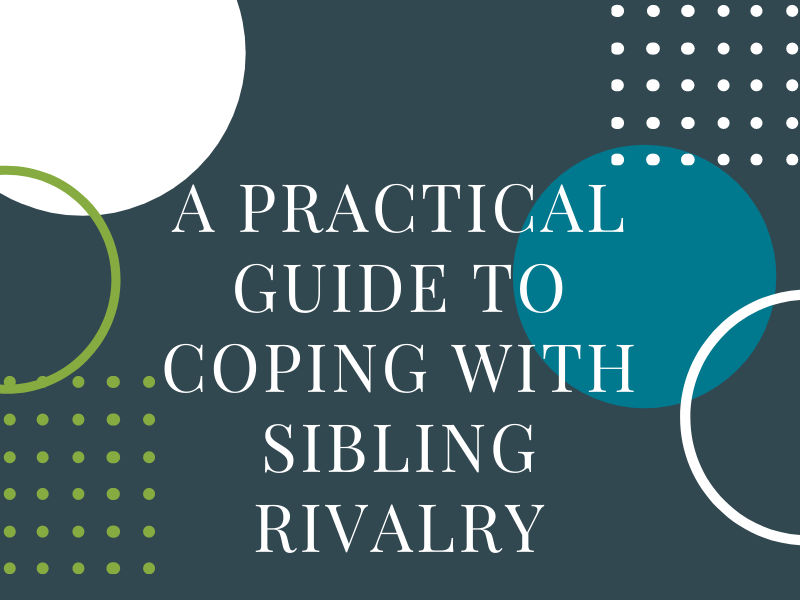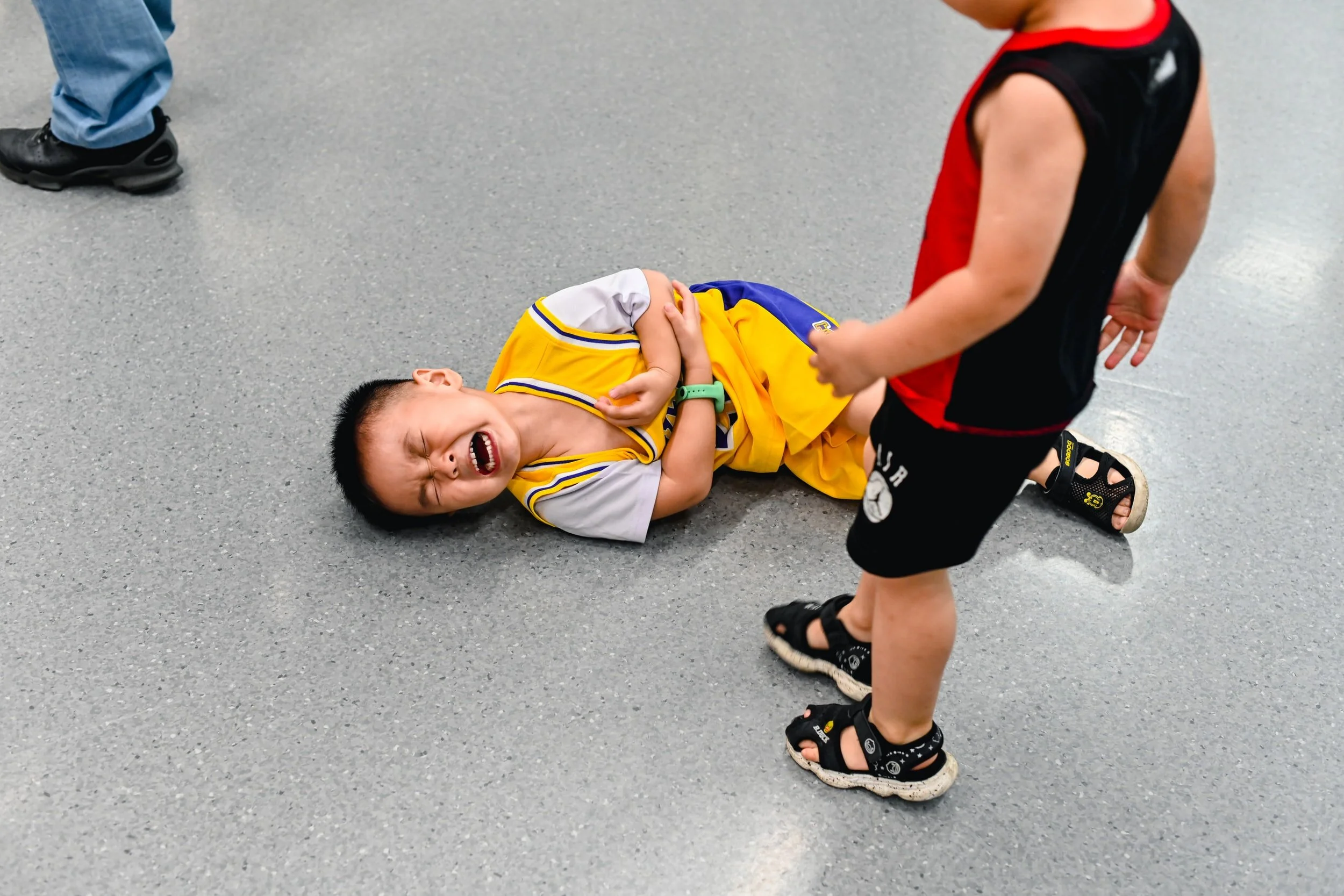A practical guide to coping with Sibling Rivalry
Are you a parent or caregiver at the end of your tether playing referee to the kids fighting or are you looking to understand why siblings squabble or physically fight? If so, read on and I will give you practical tips on how to end the arguments and offer advice on how to approach these daily behaviours so you can manage sibling rivalry and create a calmer and happier home.
In this practical guide to coping with Sibling Rivalry you will learn:
What do children experience from fighting?
The reality v’s parental expectations
When to get involved in the arguments
Consequences for dealing with Sibling Rivalry
How to resolve the arguments between Siblings
Top tips to ease Sibling Rivalry
How to encourage positive sibling relationships
As we know, these last 12 months living with Covid-19 have been intense; families have spent more time with one another than ever before! Living, working, schooling, socialising (well kind of), eating – ALL from home and with each other. Yes, the kids were fighting way before Covid-19 came along but if anything, it has emphasised relationships and conflict more.
It is now time to take a step back and look at how you can focus on encouraging these relationships between the children but also how you can approach it in the most practical way possible that will work for you and your family.
Why do children fight?
As we know, when there is more than one child in a family, fighting and sibling rivalry between them is part and parcel of what to expect – we all fought as children, do you remember the fights you had with your brother or sisters? or did you ever pick up on the frustration, exhaustion or the despair of your parents?
Probably not, because for children, it can often be a tunnel vision experience, it is emotional with intent, a habit, looking for attention, pure frustration, it gains a reaction, they know the parent will intervene and sort it out. Children fight because they know they can.
If children are quite close in age; if they are too young to know how to share – this will automatically trigger a reactive response.
When children are competitive; when they have the want to achieve more than their sibling.
If the family has welcomed a new sibling, this takes away the volume of attention that the older sibling would have automatically received.
When one child always gets in trouble and the other one is passive – it is often the quieter ones we need to keep an eye on because they can provoke the more boisterous child and as a result be triggered, retaliate and shout out loud!
Often when our time and attention go to a sibling with an additional or special need, this can give reason for the child to fight and feel frustrated. I recently spoke with Dr. Colman Noctor on his podcast series ‘Asking for a Parent’ about sibling rivalry and children with special needs.
Sometimes there is no one reason.
Within a family there will be different personalities and temperaments, various developmental stages and ages, this will be one element that contributes to the siblings fighting.
Types of Sibling Rivalry
I think we could all call ourselves experts at this stage if we are able to name the fighting that typically occurs between the kids, whether it’s between small toddlers right the way up to older teenagers, it occurs in lots of ways, it can be in the context of:
Teasing and name calling
Physically hitting out, kicking, pulling hair, pinching, biting, etc
Taking personal possessions or toys off one another without asking
Fighting over something that is not fair (this is a big one in our house)
Arguments over the TV, devices, sweet treats
One child wanting the attention off a parent
While the nature of the children fighting may vary from one family to the next and may not be mentioned above, no one parent ever should feel on their own when it comes to the kids fighting because it happens in every household! In a recent question poll I put out to my Parent Support Community, I had many parents and caregivers report back that their children will name call, criticise, antagonise and tell tales on one another, in some households there is constant bickering or children will simply fight because the other is looking at them.
What do children experience from fighting?
Like many parenting scenarios and situations our children find themselves in, they are not waking each morning hatching a plan to fight! For most of the time, it is based on what is presented to them on a given day but regardless often what the kids feel or experience can be:
The need for attention
The want to be in control
Seeking status of being the eldest
Frustration and upset
Learned behaviours – what gets a reaction
Impulsiveness
Feeling jealous or resentment
Finding it a challenge to calm down
Being easily triggered
Or up to pure devilment!
What we see and hear is the screaming, the shouting, the words, the tears, the slamming doors – but it is more than that for the child. There are often reasons that we may not put together or realise. For some it is a family of siblings to compete with or for others there is more to it, for example, a significant family transition like a new baby or a family separation, sibling with special needs, an underlying behavioural issue or struggles with school and as a result the only way the child can communicate and take out their frustration is in the form of sibling rivalry.
The reality v’s parental expectations
Whether we realised it or not prior to having more than one child, the kids fighting was probably not on top of the list of possible parenting challenges! Often when we come up against situations that we feel are out of our control or we do not know how to manage it or the kids, it can dent our confidence. I work with many families and organisations where it has gotten to that point for them; ‘we just don’t know what to do’.
If we can accept that it is part of growing up and every family experiences sibling rivalry , this is half the battle, but if we know we can approach it in a certain way that may not banish it for good but can help make it easier – we will take the latter!
When to get involved in the arguments
Over the years from working with a large variety of families with sibling rivalry issues, there is a quick and easy assessment you can do to figure out if you should get involved or let the children sort it out for themselves. The best way to help you make the decision is to use a flagging system, it is a quick resolution but it will also help you as a long term solution.
When you use this approach, it will give you an idea of what the children need from you when there is sibling rivalry and whether you need to step in or not.
Green
Children are irritating one another, there is minor squabbling or telling tales.
Stay out of it and let them resolve their disagreements.
Orange
Volume of argument goes up and name-calling begins or they are taking belongings off one another.
Acknowledge the child’s anger and frustration and reflect each child’s viewpoint.
Red
The situation becomes more serious, boisterous play turns into spilling over into a physical fight, you can see they are clearly provoking one another.
Firmly stop the interaction, review rules, give one warning for a consequence and help with conflict resolution. (One warning allows the kids time to change their behaviour, giving them lots of chances prolongs the situation)
Red Alert
If a child has become hurt or upset or an argument cannot be resolved without the parent taking action.
Firmly stop the children and separate them. If a child is hurt, attend to that child first, review the rules, and impose a consequence and follow through.
Consequences for dealing with Sibling Rivalry
Consequences often depend on the age of the children, but this approach is suitable for children of three & a half upwards. Ideally if you can have them associated with the situation in hand for example, if they are fighting about a TV programme that the TV is turned off until they agree or all calms down, preferably for a short period as opposed to all weekend. Other examples, can be early to bed, missing out on a treat, removing tablets, a toy etc. The key here is that the child cares about what they are losing out on. I spoke to Dermot & Dave on TodayFM recently about using consequences , listen back here to learn more.
How to resolve the arguments between Siblings
There is no point trying to resolve something when everyone is wound up, wait until all has calmed to chat with the kids about the fighting overall. Support the kids by problem solving , talk it out by establishing expectations.
Steps to conflict resolution
Acknowledge that you do see they fight over different things
Communicate the importance of respecting each other’s space and belongings
Recognize the feelings of frustrations on everyone’s part
Set the expectations that we do not ‘have to’ get on all the time but emphasise the importance of respect and trying
Do not insist on them being besties – relationships will grow at their pace
Top tips to ease Sibling Rivalry
Avoid taking sides
If you can offer a distraction to avoid the disagreement this can be a great way to diffuse matters straight away. Often when children fight it becomes a habit and it gets our attention. Unless you know that one child has clearly provoked the other, it is important to avoid taking sides. The child that shouts the loudest can often get the most attention so keep an eye on who is setting off whom!
Remember sometimes the more we intervene the more things can kick off, trust and leave them to their own devices, ask yourself ‘is it a green flag’ scenario?’ If you hear them fighting and it is going up a gear, as best you can approach with a calm but firm tone and say, “Let’s take it easy now so we can sort this out.” It is often good to speak to them together for whatever is going on “In this family we are gentle with one another, you know the rule”.
If you do use consequences, rather than focusing on one child (unless one has clearly provoked the other is in the wrong) try to have consequences that affect them both such as “the game is being put aside until everyone calms down” or “the TV is going off until you can decide what you both want”. If they need time away from each other, allow it. This might mean opposite sides of the house. Our children often need that space too.
Telling Tales
This all too familiar situation is part of growing up but in my eyes, it is something we want to discourage unless it is a safety or risk concern, for example the need for a child to tell an adult about something to feel safe.
Often the more we feed into the tales or stories of who did what and when, the bigger it gets, if you know that your children are telling tales for the sake of it, trying to get their sibling in trouble, getting your attention, use your own instincts to judge ‘is this something they can sort out for themselves?’. If so, let them know, often when our children are left to work it out themselves without the parental intervention, the more likely they will get on with things and the more the habit will reduce.
Keep calm & press the pause button
If it is a daily occurrence, there is no doubt it can be hard to stay calm and patient when our children fight with one another, however, the more we can press the pause button and manage our own feelings of frustration the more likely we can deal with the situation and stay focused on supporting the children. I know it may not feel as simple as that but the more annoyed we become the harder it is for everyone to calm down and sort it out.
How to encourage positive sibling relationships
Notice and praise when they are enjoying each other’s company
When our children are laughing, having fun, and playing together there is no doubt it is so lovely to see and hear; it is hard not to notice, particularly when the fighting has been relentless! The next time you see them enjoying one another’s company – let them know! “It’s so lovely to see how well you’re getting on and being gentle with one another.” Children love being praised, when you show your approval of what your child is doing, they are more likely to continue to do more of the things you want them to do and less of what you do not want them to do.
Fostering Friendships
The more positive times our children experience with one another the more it builds on their relationships, they become more aware of this as they get older and understand the meaning of friendship.
Create Space
On the other hand, make sure they get time away from one another too – while we are limited to what we can do now, even if it is one adult taking one child out for some time away, often when they get that break, they appreciate each other more!
Be Patient
As children get older their relationships with each other change, the unconditional love they have will always be there, in those early years our children are finding their place in the family and their personalities and strengths are very much part of that. What you want to avoid is insisting on the relationship/friendship to happen, they will find their connection in time.
If you are feeling overwhelmed or facing challenges with your children, I am here to help, I offer tailored 1 to 1 parent support sessions. Get in touch with me today at aoife@parentsupport.ie or if you are interested in creating a happier and calmer home I offer a Positive Parenting eLearning Course.



